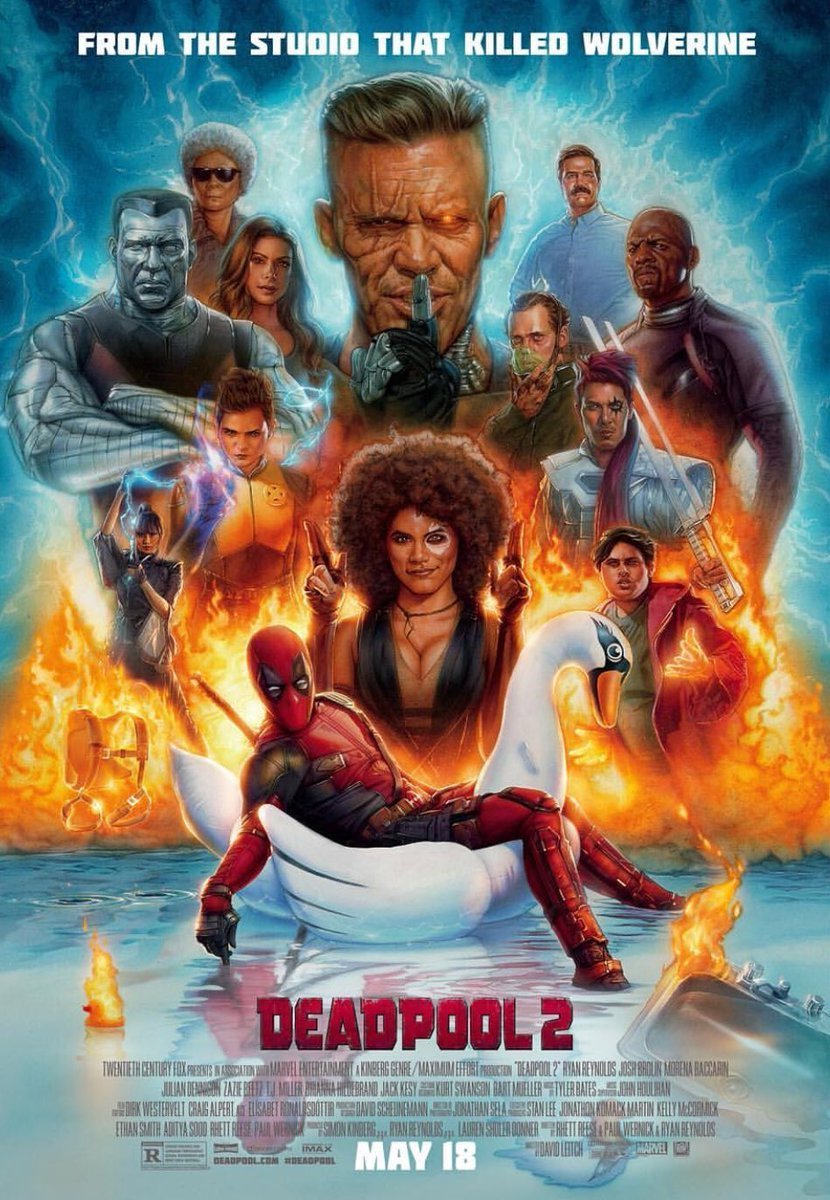Jeff York shares his thoughts on Deadpool 2 with Creative Screenwriting Magazine. D2 is both funny and surprisingly poignant too.
After the incredible and unexpected success of the first “Deadpool” film in 2016, the filmmakers probably wondered just where to take the sequel. Dirtier? Grosser? More violent? The origins story about Wade Wilson (Ryan Reynolds) and his superhero alter ego spoofed comic book tropes and movie clichés with a profane knowingness that was both fresh and outrageous two years ago. Now, we expect it, so topping such naughtiness may have seemed undoable without creeping into into NC-17 territory. Thus, it seems that director David Leitch and screenwriters Rhett Reese, Paul Wernick, and yes, Reynolds, chose to veer in an unexpected direction instead. They moved towards the sentimental. “Deadpool 2” is still a stitch, but poignant ideas about family and the afterlife get stirred in and it makes for an odd mix. It’s difficult to reconcile Deadpool caring about parenting when he’s glibly tossing out quips about his genitals.
Indeed, the film lets us know before the opening credits splash across the screen that this outing is going to tug at our heartstrings. Wade’s beloved girlfriend Vanessa (Morena Baccarin) barely has time to trade some double-entendres with her lover before she’s shot down by a thug who followed Deadpool home.
The film tries to bring back its sarcastic mojo immediately afterward by parodying James Bond ‘breaking the fourth wall’ credits, with titles like “What just happened?” and “Did they really kill her off?”, but it doesn’t entirely stick. And to compound matters, Wade keeps stopping to mourn his murdered girlfriend throughout and it starts to become maudlin.
There’s nothing wrong with the capable Baccarin playing softhearted, showing up as an angelic vision in Wade’s flights of fancy, but such sap softens the snark. The loss of Vanessa robs Wade of his key relationship from the first movie, and it leaves Reynolds doing scene after scene where he’s moping more than quipping. Reynolds too is an expert drama actor, but do we want or need such tragedy in a Deadpool movie?

Things don’t improve when the new relationship Deadpool forges to power the narrative is one with a glum and doughy teen mutant named Russell (Julian Dennison). He’s a pre-teen Kiwi with anger issues who acts out with his fists of fire. His tongue could have, and should have, been as fiery as his fingers, but instead, he’s a pitiable loser with an orphanage backstory that belongs in a different, more somber film. Deadpool spends a lot of time with Russell in the story and you keep waiting for sparks to fly. They don’t, and it drags down the fun.
There’s just too much seriousness here, but luckily, other characters pick up a lot of the satiric slack. Returning players like Colossus (Stefan Kapicic), Megasonic Teenage Warhead (Brianna Hildebrand), Dopinder (Karan Soni), Blind Al (Leslie Uggams), and Weasel (T.J. Miller) add their inspired moments of craziness and help bring the house down. The best scene of the film occurs as they react to Deadpool’s lower extremities growing back after being torn apart in a previous fight. Some hilarious CGI fakery blends Reynolds’ adult top with a toddler’s nude bottom. Once seen, it cannot be unseen, but it is hysterical, as are the reactions of his old pals to their leader’s maturing body.
Even the new villain in this one leans too strongly towards schmaltz. Cable (Josh Brolin, ol’ Thanos himself, doing double-duty for the MCU this season) is a time-traveling soldier who is driven towards vengeance after the murder of his wife and daughter. It’s all a bit too on the runny nose. Fortunately, the film dials up Brolin’s droll comic abilities in the last half of the story and makes his baddie into more of a funny foil. Indeed, the two major set-pieces in the last half hour involving Cable are utter hoots, particularly the highway chase where Deadpool’s newly hired cohorts meet awful demises.
By the end, the laughs become as big and uproarious as they should be in a “Deadpool” sequel, and the guffaws continue throughout the extended post-credits sequence. Reynolds proves once again that he is one of the best comic actors working today. His snide asides could’ve given Groucho Marx a run for his money. And Reynolds’ physical prowess as a comic is extraordinary too, especially considering that he has to be believable doing all the straight action stunts as well. (Let’s hope the Golden Globes reward him this time out, after shamefully passing over him in 2016.)

And just as Marvel Studios’ “Black Panther” set up supporting characters for spin-offs, 20th Century Fox does so here with the addition of Zazie Beetz’s Domino character. When being recruited to be Deadpool’s sidekick, she boasts that her super power is luck. And indeed it is, as evidenced by all the incredible ways she skirts death during her fight scenes. Perhaps she and Letitia Wright’s Shuri character could do a crossover in the future. Their combination of youthful savvy, chutzpah, and sex appeal would make for a must-see movie.
At the end of it all, “Deadpool 2” is sharp entertainment that just needed to push the envelope more. Hopefully, they will in the third, as it looks like they’ve set up a way for Vanessa to return intact. (It even plays like a sly riff on the controversial “Avengers: Infinity War” climax from just last month.) Both she and the “Deadpool” franchise need to err on the side of being more politically incorrect. It’s funny, but for a movie that lampoons Wolverine’s demise in “Logan”, “Deadpool 2” came very close to trafficking in a similar gloom and doom. Less pathos and more raunch next time, please.
If you haven’t seen Deadpool 2 yet, catch the trailer HERE.
